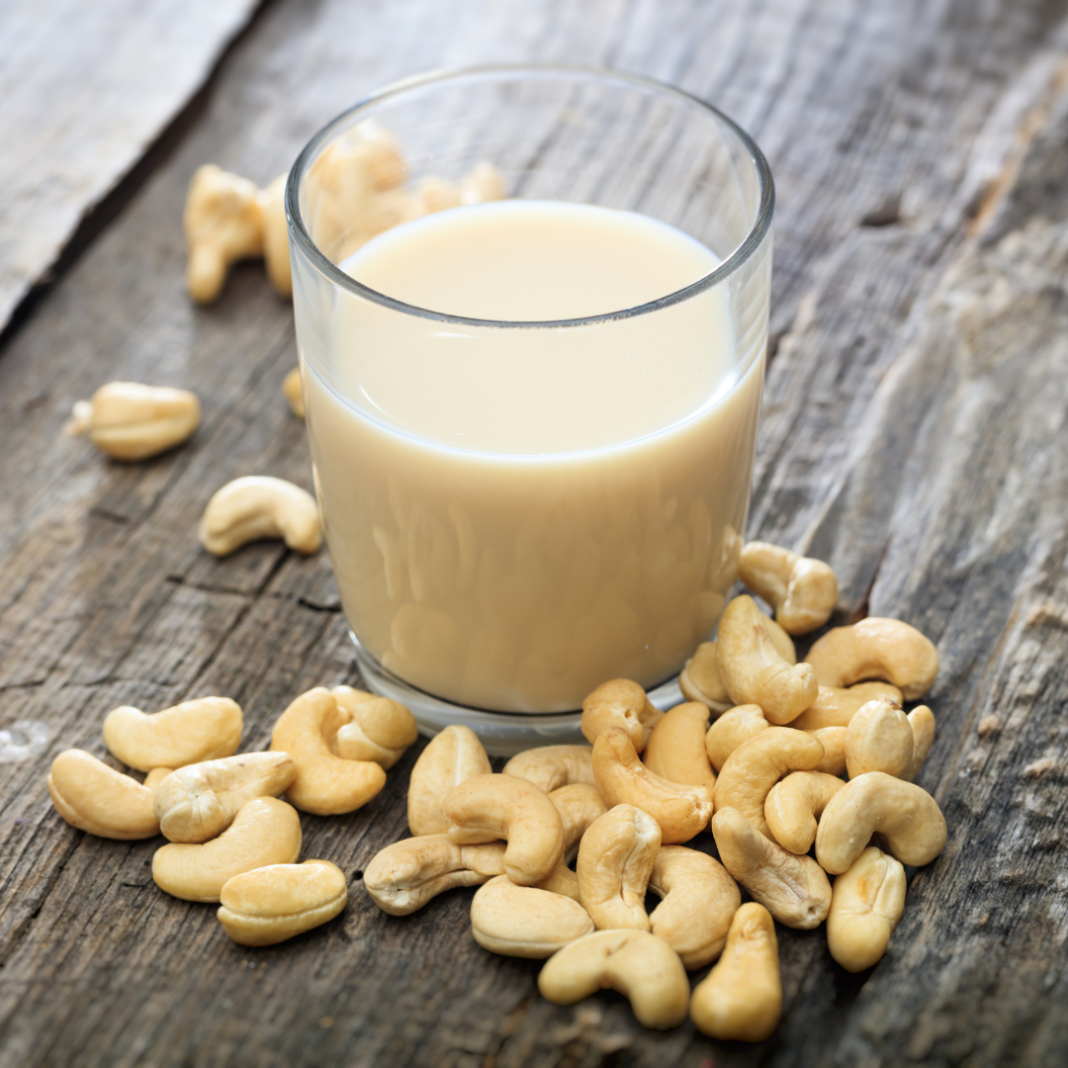Cashew milk is non-dairy milk that is produced using cashews and water. It is a popular plant-based milk alternative, as it is low in calories and carbohydrates, and contains high levels of healthy fats and minerals.
The cashew fruit grows off a cashew tree and can be used to produce cashew cheese, cashew butter, or even eaten fresh. It is a suitable alternative to cow milk, goat milk, or any other type of dairy milk and can be used in cooking and baking recipes as well.
Article Content
How to Make Cashew Milk
Making cashew milk is simple. All you need are cashews and water. Place the cashews in a blender or food processor and add enough water to cover them. Blend or process until the cashews are broken down and the mixture is smooth. Strain the milk through a fine-mesh strainer or nut milk bag to remove any bits of cashew. You can then use the milk as is, or refrigerate it for later.
Health Benefits of Cashew Milk?
Cashew milk is highly nutritional because it contains natural ingredients, and no additional or extra artificial components. The health benefits of consuming cashew milk are endless, and below are a few of them.
Cashew milk is good for your heart.
Research has shown that those who consume cashew milk often have low risks of having heart diseases. Perhaps this is why it appeals to a lot of older people because it contains potassium and magnesium, two nutrients known to prevent heart diseases. For effective results, homemade cashew milk contains more nutrients than the off-the-shelf variants.
It helps your eyes.
Cashew milk contains antioxidants like lutein and zeaxanthin which are known to improve eye health a lot. Adding cashew milk to your diet will provide a lot of these antioxidants, and overall improve your sight.
Cashew milk is great for your skin.
Copper is one of the major nutrients in cashew. Drinking cashew milk means you’ll have an abundance of copper in your body, which is great for your skin. Copper regulates collagen levels in your body and helps your skin look fresher, and rejuvenated.
It boosts the immune system.
Cashew milk is rich in zinc, and zinc is a good immune booster. Hence, consuming a lot of cashew milk means you are building your body’s immunity.
How to Add Cashew Milk to Your Diet
Introducing a new food item to your diet can be a bit tricky. Therefore, it is important to do your research and study your own dietary needs, pay attention to your body and build on that. Here is a list of suggestions on how you can introduce cashew milk into your diet.
Substitute cow milk for cashew milk in your baking.
If you enjoy eating baked goods, then consider baking with cashew milk. The best part is it does not contain any lactose, so if you are lactose-intolerant, you can also use it.
Use cashew milk in your sauces and coffee.
For creamy pasta sauces, try adding cashew milk because it is sweeter and creamier. If you are a coffee lover as well, you can substitute cow’s milk with cashew milk in your coffee.
Add cashew milk to your smoothies.
Cashew milk contains natural sweeteners that give it a natural, sweet taste. So if you love healthy smoothies, add it.
Potential Side Effects and Allergies of Cashew Milk
Common side effects of consuming cashew milk include bloating, constipation, weight gain, and even joint swelling in extreme cases. If you are allergic to cashew, or nuts in general then you may experience severe symptoms like itchy mouths, having difficulty swallowing, nausea, or diarrhoea.
Cashew Milk vs Almond Milk
Although they are both plant-based, almond and cashew milk are quite different from each other. Almond milk is quite richer in proteins and fibre than cashew milk. While cashew milk is richer in copper and fats. Cashew milk has a creamier texture unlike almond milk, which makes it a better option for baking and cooking. Also, cashew milk does not have a strong nutty taste like other plant-based milk, which is why a lot of people prefer it instead of almond milk.
Cashew Milk vs Cow Milk: Calories
When it comes to comparing the calorie content in cow milk and cashew milk, cow milk has more calories per cup. A cup of cow milk contains 146 calories, whereas cashew milk only has 30-60 calories per cup depending on the brand of cashew milk you buy. Cashew milk is by far the lowest in terms of calorie content when compared to other types of plant-based milk.
Cashew Milk vs Cow Milk: Fat
Cashew milk has 8 grams of fat per cup. Cow milk, on the other hand, contains around 8-9 grams of fat per cup. Cashew milk is low in saturated fats compared to cow milk. A high intake of saturated fat can lead to increased cholesterol levels and increase the risk for heart disease.
Can Cashew Milk be Heated?
Cashew milk can be heated. Heating it will not change its nutritional value or destroy any of its nutrients. In fact, heating it will help to release some of the flavours and make it creamier.
Can Cashew Milk be Refrigerated?
Yes, it can be refrigerated. However, after drinking the amount you need, you won’t need to store the rest in the fridge because cashew milk doesn’t go bad easily. If stored properly, it can stay fresh for about 2-3 days.
Read Also: 8 Benefits of Green Tea You Might Not Know About


